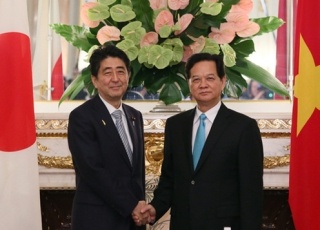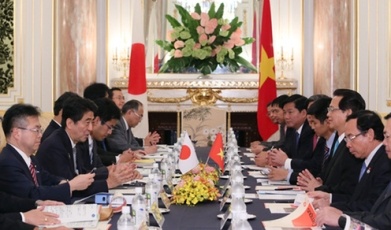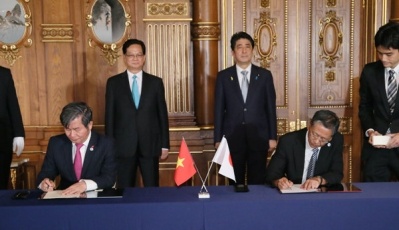Japan-Viet Nam Relations
Japan-Viet Nam Summit Meeting
 (Photo: Cabinet Public Relations Office)
(Photo: Cabinet Public Relations Office)
 (Photo: Cabinet Public Relations Office)
(Photo: Cabinet Public Relations Office)
 (Photo: Cabinet Public Relations Office)
(Photo: Cabinet Public Relations Office)
On July 4 from 6:35 p.m. for approximately 50 minutes, Prime Minister Shinzo Abe held a Japan-Viet Nam Summit Meeting with H.E. Mr. Nguyen Tan Dung, Prime Minister of the Socialist Republic of Viet Nam, who is on a working visit to Japan to attend the Seventh Mekong-Japan Summit Meeting. After the meeting, both leaders participated in the exchange of signatures ceremony and held a joint press conference, and then continued on to the venue for the evening banquet where they also exchanged opinions.
1. Opening remarks
In his opening remarks on Japan-Viet Nam relations, Prime Minister Abe stated that under the “Extensive Strategic Partnership,” bilateral cooperation has been developing over a diverse range of fields; and expressed his hope to continue strengthening cooperation with Viet Nam in the context of the increasingly severe security environment in the Asia-Pacific Region. Prime Minister Abe also remarked that he intended to support infrastructure development both in terms of quality and quantity, based on the Partnership for Quality Infrastructure.
Prime Minister Dung praised Japan for the role it played as the host nation of the Seventh Mekong-Japan Summit Meeting, and said he hoped that their cooperation would develop even further in every field under their “Extensive Strategic Partnership.”
2. Security, etc.
Prime Minister Abe commented that in this year, which marks the seventieth anniversary of the end of World War II, Japan will continue on its path as a peace-loving nation and promote its “Proactive Contribution to Peace,” and resolved to contribute even further to the peace and security of international society, such as through UN Peacekeeping Operations (PKO).
Prime Minister Dung expressed his support for Japan’s “Proactive Contribution to Peace” and its path as a peace-loving nation, highly praising Japan’s contribution to peace and security in the region and international society, and that Viet Nam supported Japan becoming a permanent member of the United Nations Security Council. Also, Prime Minister Dung touched on the importance of high level exchange to enhance mutual understanding, and invited Prime Minister Abe to once again visit Viet Nam.
Both leaders shared their deep concern over unilateral attempts to change the status quo in the South China Sea, such as by large-scale reclamations and the construction of military bases. Prime Minister Abe urged self-restraint for unilateral actions that will heighten tension, and the two leaders agreed to cooperate together to protect international law based on “the Rule of Law at Sea.” Prime Minister Dung commented on the importance of peace, security, and freedom of navigation in the South China Sea.
3. Bilateral relations
Prime Minister Abe stated that Japan intends to actively investigate participating in urban development projects and related projects in Viet Nam in which Japanese companies are interested; and also to cooperate toward further developing the concept of the Japan-Viet Nam University.
Prime Minister Dung once again expressed his gratitude for Japan’s development assistance up to the present, which he said played a major role in developing Viet Nam’s economy and society; and also asked for Japan’s continued assistance in the future toward Viet Nam’s sustainable development. In addition, Prime Minister Dung once again expressed his gratitude for Japan’s grant aid last year for used maritime vessels and equipment, and that Viet Nam has requested the new patrol vessels so that it can protect its waters and its fishermen. Prime Minister Dung also welcomed the participation of Japanese companies in development projects within Viet Nam, and stated that his government would establish and maintain the investment environment to promote continued investment by Japanese companies.
Responding to Prime Minister Dung’s request for development assistance, Prime Minister Abe commented that Viet Nam could expect Japan to respond positively to such a request; and that he hoped to advance discussions on the new patrol vessels with Viet Nam and realize this assistance at an early stage.
4. Cooperation in the regional and international arenas
Other than the above, the two leaders had meaningful discussions on bilateral cooperation in the regional and international arenas, including on reforms to the United Nations Security Council, the North Korea issues, the Trans-Pacific Partnership (TPP), and the Regional Comprehensive Economic Partnership (RCEP).

